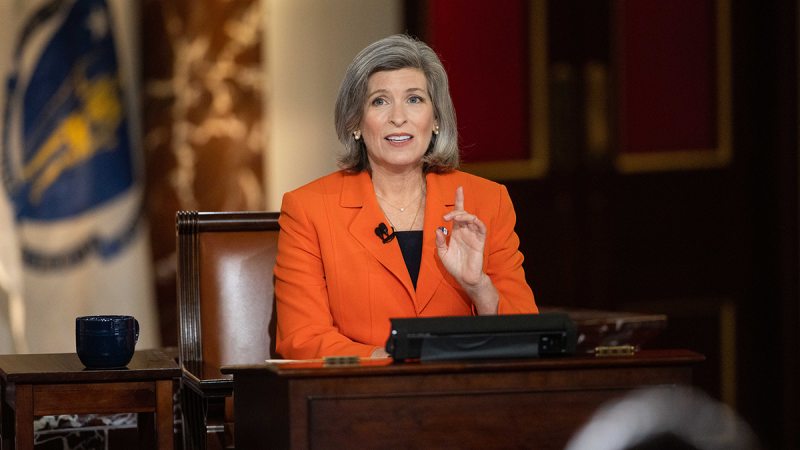Sen. Joni Ernst, R-Iowa, is urging the Inspector General to launch a federal investigation into whether some government agencies are overpaying remote workers who receive a Washington D.C. salary but live in a lower cost of living state — a problem she says was exacerbated by the COVID-19 pandemic.
Remote work spread rapidly as a way to keep some industries afloat during nationwide stay-at-home orders, and government agencies were no exception. However, Ernst said the government is typically inept at keeping track of its workers, leading to ‘an avalanche’ of problems that started years before the pandemic.
After several instances revealed employees were playing golf or soaking in a bubble bath while on the clock, Ernst wants an investigation into whether federal remote workers are meeting specific performance metrics that proves they are actively working during business hours.
‘We’re paying salaries for people that aren’t working, they’re earning benefits and retirement benefits that they don’t deserve,’ Ernst said to Fox News Digital. ‘It’s theft.’
Federal managers told Ernst about several instances where, unbeknownst to the employees, they can see when workers log on and off to their systems. One manager shared that they will see workers log on at the start of the day, and then ‘go dark’ for the remainder of the day.
‘We are doling out how many millions if not billions of dollars in salaries for people that claim to be remote working, but aren’t even actually working, period,’ she said.
An example Ernst cited was a manager overseeing a team responsible for helping veterans schedule appointments at the Atlanta VA Medical Center — which faces one of the lengthiest doctor appointment wait times in the nation — was outed for spending an hour in a bathtub while on duty.
In the manager’s Instagram post, his government-provided laptop was visible, displaying a staff meeting, all while his legs were submerged in the bath.
‘MY OFFICE FOR THE NEXT HR,’ the caption read.
In a recent letter to Inspector General Diana R. Shaw, Ernst cited an Office of Personnel Management survey which found only one in three federal employees are fully back in the office, while less than one in five ‘never’ report to a physical office.
During a two-month span in the fall of 2022, only five percent of the federal workforce that typically operated from government-leased offices in the Washington, D.C. area physically reported for work on an average day, according to data from the General Services Administration and analyzed by the real estate firm Cushman & Wakefield.
A Government Accountability Office review found that the headquarters of 17 different federal agencies have more than 75 percent of their available office space vacant.
‘We should not be paying for office space that is not being used,’ Ernst said, adding that it’s time for government employees to return to office.
‘It’s taxpayer money that they are stealing,’ she said. ‘So, we’re gonna figure this out, but I want federal employees to know this is a warning shot to them. They better make it right, or we’re coming after them.’
The Inspector General’s office is expected to have a report back to Ernst by the end of next month, she said.
Ernst isn’t the only Republican in Congress pushing for federal employees to return to in-person work. In January, the GOP-led House passed the SHOW UP Act, a law that would require civil servant employees to show up to their offices. Twenty-six Republicans co-sponsored it.
‘The federal workforce needs to get back to work,’ Republican Kentucky Rep. James Comer, sponsor of the SHOW UP Act, said just before a vote on the House floor.
‘Federal agencies are falling short on their missions. They are not carrying out their duties. They are failing the American people,’ he said.
